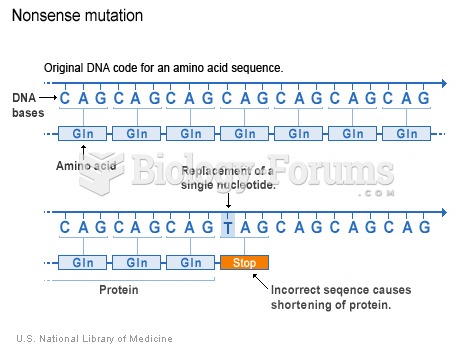|
|
|
Parkinson's disease is both chronic and progressive. This means that it persists over a long period of time and that its symptoms grow worse over time.
Earwax has antimicrobial properties that reduce the viability of bacteria and fungus in the human ear.
As many as 28% of hospitalized patients requiring mechanical ventilators to help them breathe (for more than 48 hours) will develop ventilator-associated pneumonia. Current therapy involves intravenous antibiotics, but new antibiotics that can be inhaled (and more directly treat the infection) are being developed.
Drying your hands with a paper towel will reduce the bacterial count on your hands by 45–60%.
The first war in which wide-scale use of anesthetics occurred was the Civil War, and 80% of all wounds were in the extremities.
 The grey side-gilled sea slug Pleurobranchaea maculata. The discovery of tetrodotoxin in this slug i
The grey side-gilled sea slug Pleurobranchaea maculata. The discovery of tetrodotoxin in this slug i
 The grey side-gilled sea slug Pleurobranchaea maculata. The discovery of tetrodotoxin in this slug i
The grey side-gilled sea slug Pleurobranchaea maculata. The discovery of tetrodotoxin in this slug i





